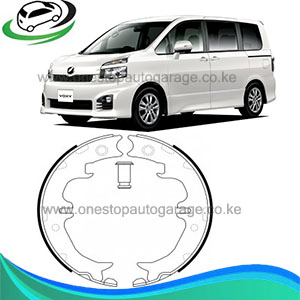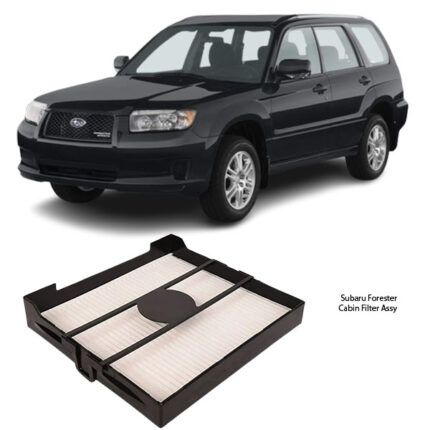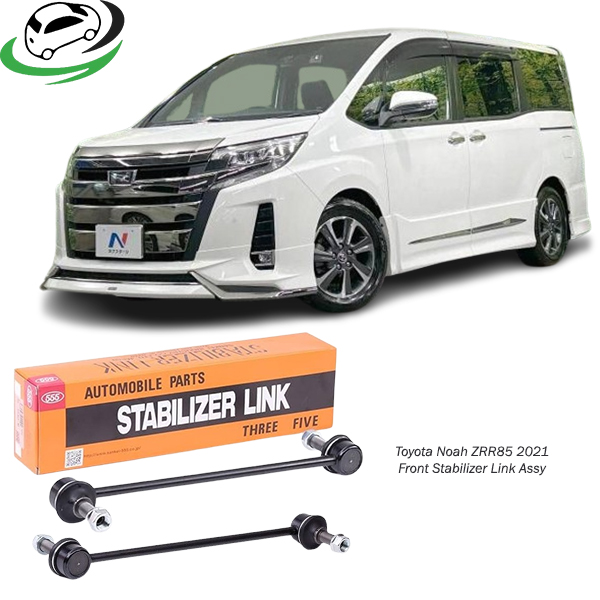-10%
Get Toyota Noah ZRR85 2021 Front Stabilizer Link Assy SL3640 in Kenya
The front stabilizer link assembly (often referred to as the sway bar link or anti-roll bar link) is a critical component in a vehicle’s suspension system. Its primary function is to reduce body roll and enhance vehicle stability, especially during cornering or when driving over uneven surfaces. A properly functioning stabilizer link plays a vital role in ensuring the vehicle handles predictably and safely.
In this detailed explanation, we will dive deep into the structure, function, benefits, and maintenance of the front stabilizer link assembly. Understanding how it works and how to maintain it can help ensure your vehicle’s suspension system performs optimally for years to come.
What is a Front Stabilizer Link Assembly?
The front stabilizer link assembly is a part of a vehicle’s suspension system. It connects the stabilizer bar (also called the anti-roll bar or sway bar) to the suspension components, such as the control arms. The stabilizer bar itself is designed to minimize the amount of body roll or lean that occurs when a vehicle turns, especially at high speeds or during sharp cornering.
The stabilizer link is the connector that allows the sway bar to work in harmony with the suspension. It is typically made of metal, with rubber bushings or ball joints at either end to allow for movement while maintaining stability.
How Does the Front Stabilizer Link Work?
When a vehicle turns, the weight of the vehicle shifts to one side, causing the body of the car to roll toward the outside of the turn. This can make the ride feel less stable, especially in sharp turns or on uneven surfaces. The stabilizer bar helps counteract this by distributing the weight more evenly across the vehicle’s frame, preventing excessive body roll.
The front stabilizer link connects the stabilizer bar to the suspension components on either side of the vehicle. When the car turns or encounters rough terrain, the stabilizer bar applies force to the stabilizer links, which then transfer the force to the suspension, helping keep the vehicle level. This means that the vehicle is less likely to lean or tip during turns, improving stability and handling.
Without properly functioning stabilizer links, the stabilizer bar cannot perform its intended job effectively. As a result, you may experience excessive body roll, less responsive handling, and reduced comfort, especially during sharp turns or when driving on uneven roads.
Benefits of a Front Stabilizer Link Assembly
The front stabilizer link assembly contributes to several key aspects of vehicle performance and safety:
- Improved Handling and Stability
The main purpose of the stabilizer link is to minimize body roll, which improves the vehicle’s overall handling. By keeping the car more level during turns, the vehicle’s response to steering inputs becomes more precise. This ensures safer and more predictable handling, particularly in high-speed corners or when changing lanes. - Enhanced Ride Comfort
The stabilizer bar reduces the amount of body sway you feel when turning or driving over bumps. By linking the suspension system to the sway bar, the stabilizer link helps to absorb these movements, providing a smoother and more comfortable ride. - Better Control on Rough Roads
When driving on uneven or bumpy roads, the stabilizer link helps to maintain a level ride by reducing the sway caused by irregular surfaces. This improves the overall driving experience, especially when dealing with potholes or rough terrain. - Extended Tire Life
A stabilizer link that is functioning properly helps the suspension system distribute weight more evenly, which can reduce the amount of wear and tear on the tires. This can contribute to a longer lifespan for your tires, as well as better road traction. - Improved Safety
Excessive body roll can lead to reduced control, which can be dangerous, particularly in emergency maneuvers. The stabilizer link’s ability to control body roll improves the vehicle’s stability and reduces the risk of accidents caused by losing control during sharp turns.
Signs of a Faulty Front Stabilizer Link
Like all suspension components, the front stabilizer link assembly is subject to wear and tear over time. It’s essential to know the signs of a faulty stabilizer link so you can address the issue before it leads to further damage or safety risks. Here are some common symptoms of a faulty stabilizer link:
- Clunking or Knocking Noises
If you hear a clunking, knocking, or rattling sound coming from the front of the vehicle, especially when driving over bumps or making sharp turns, it may indicate a problem with the stabilizer link. Worn-out bushings or damaged joints can cause loose parts that make these noises. - Increased Body Roll
If you notice that your vehicle leans more than usual during turns or cornering, it could be a sign that the stabilizer link is not functioning properly. Excessive body roll can make the vehicle feel unstable, especially in tight corners. - Poor Handling or Steering Response
A damaged stabilizer link can lead to poor handling characteristics, including sluggish steering response. You might notice that the vehicle feels less responsive when turning or when making quick maneuvers. - Uneven Tire Wear
Worn stabilizer links can lead to uneven distribution of forces across the suspension, which can cause uneven tire wear. If you notice your tires are wearing down more quickly on one side, it could be linked to an issue with the stabilizer links or other suspension components. - Vibrations in the Steering Wheel
Another sign of a problem with the stabilizer link assembly is noticeable vibrations or shaking in the steering wheel, especially when turning. This can be a result of loose or damaged components in the suspension system.
Maintaining the Front Stabilizer Link Assembly
Proper maintenance of the front stabilizer link assembly can extend its life and help maintain the overall performance of the suspension system. Here are a few tips for ensuring the longevity and effectiveness of your stabilizer links:
- Regular Inspections
Have the stabilizer links inspected regularly as part of your vehicle’s routine maintenance. This allows you to catch any signs of wear or damage early, before they cause major issues with handling or safety. - Replace Worn or Damaged Components
If you notice any of the signs of a faulty stabilizer link, such as clunking noises or excessive body roll, it’s important to replace the worn or damaged parts as soon as possible. Ignoring these issues can lead to more extensive damage to the suspension system. - Use Quality Replacement Parts
Always replace the stabilizer links with high-quality, manufacturer-approved parts. Genuine or aftermarket components that meet the required specifications will ensure optimal performance and durability. - Check the Bushings
The rubber bushings on the stabilizer links can wear down over time, which can lead to noises and reduced effectiveness. Make sure to replace these bushings when needed to maintain proper function. - Avoid Overloading the Vehicle
Excessive weight in the vehicle can put additional stress on the suspension system, including the stabilizer links. Avoid overloading your vehicle to prolong the lifespan of these components.
Conclusion
The front stabilizer link assembly is a crucial part of a vehicle’s suspension system that plays a significant role in improving handling, stability, and ride comfort. By connecting the stabilizer bar to the suspension components, it reduces body roll and enhances the vehicle’s overall performance. Regular maintenance, prompt repairs, and timely replacements can ensure your vehicle’s suspension system stays in top condition, leading to a safer and more enjoyable driving experience.
By understanding the function and importance of the front stabilizer link assembly, vehicle owners can take proactive measures to maintain their suspension systems, extend the lifespan of their cars, and ensure they are always ready for the road ahead.
Follow us on Facebook for more parts.



